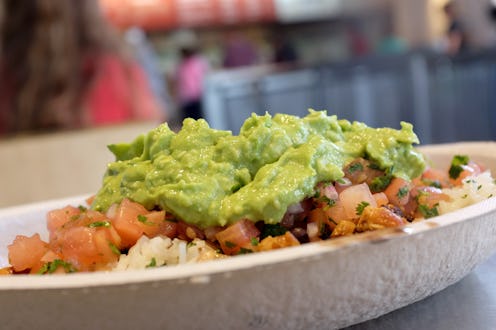News
Your Favorite Chipotle Meat May Be Unavailable
First there was the great guacamole shortage of 2014, and now, carnitas are on the chopping block at Chipotle, the great burrito mecca of the United States. After the restaurant chain discovered that one of its suppliers violated animal-welfare standards, Chipotle has stopped serving pork at a third of its locations, sending hundreds of thousands of pseudo-Mexican-food lovers into a panic. This means that some 500 to 600 Chipotle restaurants will temporarily suspend its carnitas offerings, so thank goodness they've introduced a new, tofu sofritas filling you can soon get for free, right?
The silver lining of this entire debacle (if you can stop your tears long enough to see one) is that it certainly suggests that Chipotle takes animal rights very seriously, so rest assured that the meat you're consuming is ethically produced and harvested. According to a spokesman for the franchise, the guilty pork supplier, which has remained unnamed, raised pigs in unhealthy environments, denying them access to the outdoors or to the more comfortable deeply bedded barns the animals prefer. In an email statement, the spokesman noted:
The differences in animal welfare between pigs raised this way and pigs that are conventionally raised [are] stark, and we simply won’t compromise our standards this way.
The welfare violations were discovered Friday following a routine audit of the supplier's facilities, and its effects were immediate and far-reaching. On Tuesday, a New York City Chipotle location sported a sign at the front door that read, "Sorry, No Carnitas." And unfortunately for pork lovers, the chain does not have a timeline for how long this outage may last. Spokesman Chris Arnold told the Associated Press it would be "hard to say" when pork could be expected back on the menu of affected locations. This is the first time Chipotle has ever completely stopped serving a topping or filling for its menu offerings.
Chipotle's dedication to its product and to the maintenance of sustainable practices when it comes to its food has long been a differentiating factor between the restaurant and other competing fast food chains, which rarely maintain the same standards. Since 1993, the franchise has shied away from antibiotics, added hormones, and certain pesticides, opting instead for "responsibly raised" organic meat and vegetables. However, this has not always been possible, as Arnold pointed out. On numerous occasions, the company has been forced to serve meat that is more "conventionally raised," that is to say, with added hormones and antibiotics. However, whenever that happens, Chipotle notifies its customers that the product does not meet its standards, but is still, to some extent, acceptable.
But in the case of the pork supplier, apparently, this was not the case. According to Paul Shapiro, vice president of farm animal protection for the Humane Society of the United States, the vast majority of pigs in the country are raised in deplorable circumstances and spend their lives in gestation crates with concrete floors. The pigs that produce the pork that Chipotle requires, those that are granted access to the outdoors or bedding, comprise only a "very small portion of the pork industry," Shapiro says.
And even those who live in comparatively better environments might still be treated inhumanely — as Shapiro told the Associated Press, even adding Chipotle's "responsibly raised" designation "doesn't mean these animals are living in ideal conditions on Old MacDonald's farm."
Luckily for Chipotle, their carnitas option is not the most popular on the menu, representing only 6 to 7 percent of orders. If the ban affected, say, chicken, the restaurant would be in much bigger trouble with its customers. Still, Arnold told the AP that the chain is looking for ways to offset the shortage, and might increase its orders of pork from other suppliers or use different cuts of pork. And hopefully, once the guilty supplier addresses its pig-raising condition issues, it will return to Chipotle's good graces.
The Mexican fast food chain has grown in popularity since its founding more than two decades ago in Denver, Colorado, and as of September 30 of 2014, boasted 1,724 restaurants nationwide. Sales have increased nearly 20 percent over the last quarter, and the franchise continues to attract more business as America's love affair with burritos and bowls only deepens. But for now, that love affair will have to exclude pork, at least until Chipotle is satisfied that the pigs have lived a happy life before feeding your appetite.
Images: Getty Images (3)
